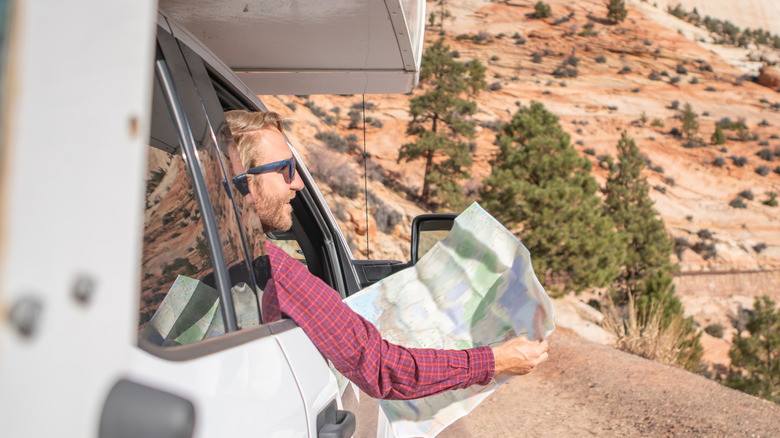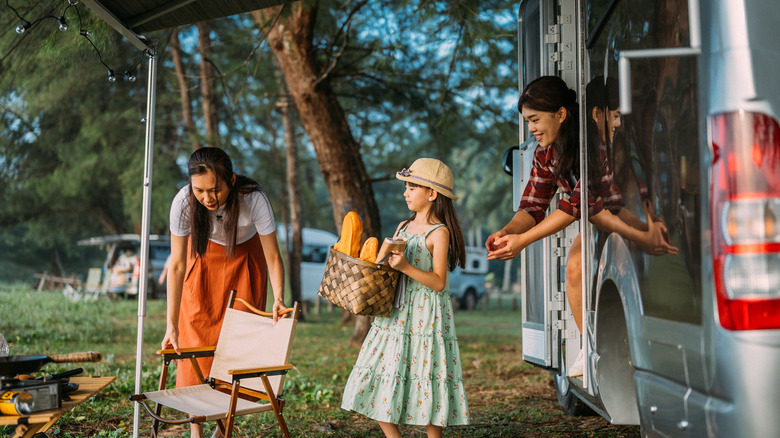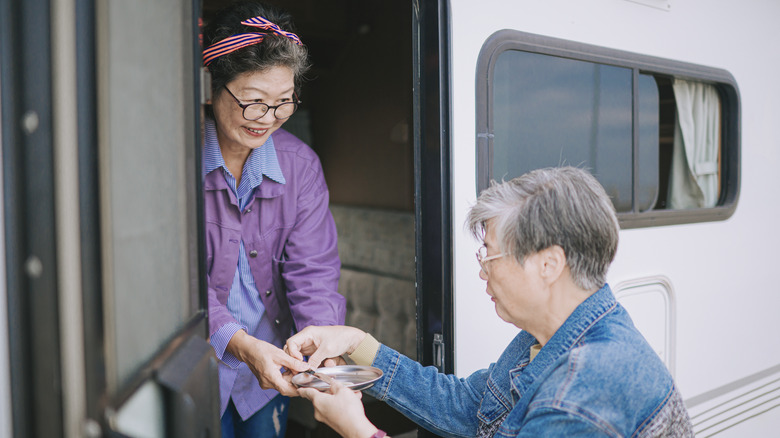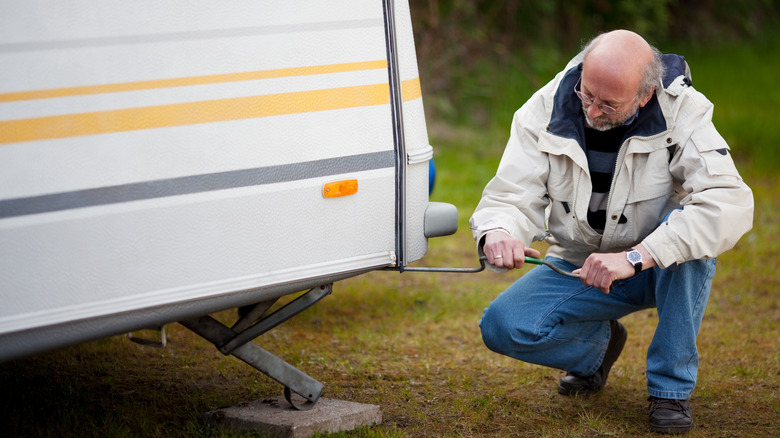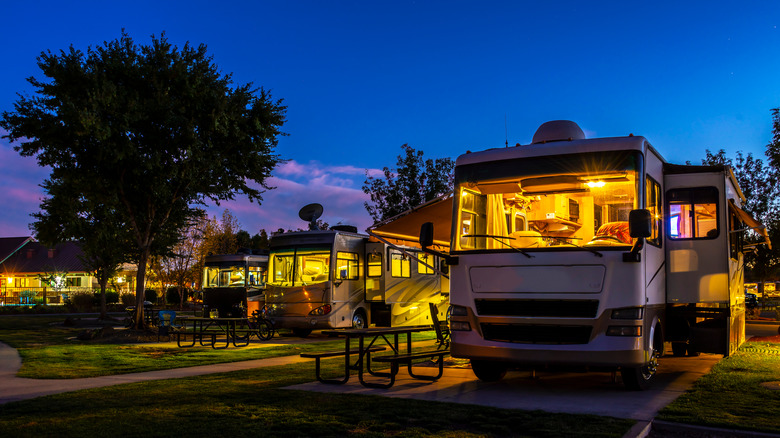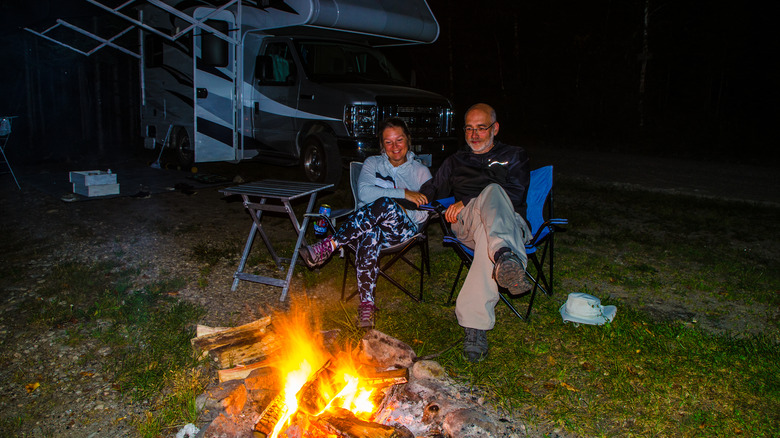Why You Should Always Arrive At Your RV Campsite Before Dark
Imagine arriving late to your campsite after a long day of driving. Though the stars are out and the night sky might be dazzling, you don't have the time nor the energy to appreciate it. On the contrary, you're trying your best to focus backing in your RV despite your tiredness, grumpiness, and hunger. In the dark, the meager light emanating from your flashlight makes you wish you had arrived when it was still light.
Whether it's a rookie mistake or a failure to plan well, arriving at your campsite when it's already dark is a risky proposition. In fact, one guideline most RVers follow — which is part of the 3-3-3 rule — is to arrive at the campgrounds before 3 p.m. While this isn't set in stone and some expert RV travelers tweak this rule to suit their preference (for instance, 2-2-2 or 4-4-4), most veterans advise that those new to RV camping should stick to this rule. Most RV parks discourage or outright prohibit arriving at the site when it's already dark with a strict check-in policy that's typically set in the early to late afternoon. Aside from this, it's just more sensible to settle into your campsite when the sun is still out.
Setting up your RV is easier
If you did not reserve a spot at a pull-through campsite, then you'll need to set up your RV in the dark. Even with a nightlight, it still might be hard to see slopes, holes, or unevenness of the ground as well as any objects that may obstruct your vehicle from parking safely in your site. Don't even mention backing in.
Bottom line: Setting up your RV camper at night can be dangerous. As you won't be able to see clearly in the dark even with a flashlight, there's no telling for sure that your mobile home is level or that it has not hit an object while you were backing into your spot. It could also lead to damages or, worse, your RV could topple over — both undesirable results — leaving a dent in your investment or landing you into some financial obligation if it's a rented RV. Compound this by the fact that if you're new to RVing, you most probably don't have enough practice setting up your vehicle. And, the lack of visibility only diminishes your chances of doing it successfully.
Someone can assist you
Whether you like planning or not, going on an RV vacation requires some form of schedule. Because you'll be staying at different campsites with varying rules, it's critical that you know your campground's check-in policy beforehand because most discourage nighttime arrivals. So, to avoid being turned away and having to resort to boondocking or locating another campground, which could be miles away, you should follow your campsite's check-in policies.
When you do, campground staff will still be around in case you need any help. Whether that's with the campsite, your spot, or setting up, you can always approach the staff. They will most likely be around when the office is open, which is typically from morning to afternoon. The RV community is also a friendly bunch and will gladly offer you advice and any other help you might need. But, if you arrive late in the evening, other RVers will mostly likely be resting in their own mobile homes and don't want to be disturbed.
You'll be safe
With ample light and with someone from the campground to help you, setting up your RV before dark will keep you safe and warm. During the daytime or even in the afternoon sunlight, you'll still easily locate your site and hook up to your water, electricity, and sewage connections without any problems. If you arrive especially late, such as at midnight or afterward, you could end up unhooked from utilities and sleeping in the cold parking lot. But, that's just the least of your problems.
Arriving before nighttime will also let you have a good look at your surroundings. Safety is especially important when you're boondocking, or spending the night somewhere that's not an RV campsite, which might be what you'll be doing since most campgrounds don't allow check-ins at night. While boondocking is free, you don't have access to electricity or water. It's kind of the "roughing it" version of RV camping, so it's essential that you make sure you're parked in a safe place — for instance, you're not near a cliff or where poison ivy thrives.
You won't be breaking camping etiquette
Campgrounds often implement quiet hours between 10 p.m. and 6 a.m. And, there's an unwritten rule to avoid arriving after 10 p.m. If you do and try to set up later, you might only be causing a ruckus. You can either keep it quiet or delay your RV setup for the morning when everyone else is up and about.
Sneaking into a spot without a reservation in the middle of the night is also a big no-no. If you do this, especially during busy season, chances are you'll be leaving once campground staff discover your presence. If they offer overflow parking, you might be allowed to stay, but this isn't guaranteed. Even during the off-season, you might still be asked to return at their check-in time to allow their staff to prepare your spot when you come back. So, always have a reservation and communicate with campground staff in case you're running late.
You have enough time to rest
If you arrive late at your campsite, chances are you won't have enough time to settle in and rest. But, resting is important if you want to make it through your RV vacation happy, healthy, and safe. Although you might want to pack as much sightseeing and as many activities as you can in a day, remember that the RV life is not like the rushed city life you're living behind.
RV camping asks that you take it easy. Your vehicle requires it (speed limits vary by state but range between 70 and 75 mph) and you need it too. Arriving before dark lets you set up your mobile home with ease and leaves you plenty of time to frolic and explore your new campsite or meet your neighbors. It will also allow you to recuperate from the long day or hard journey. Driving until nighttime could lead to road fatigue or travel burnout, but what you really need is to pause, relax, and regain energy for the next leg of your RV trip.
